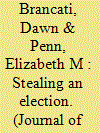|
|
|
Sort Order |
|
|
|
Items / Page
|
|
|
|
|
|
|
| Srl | Item |
| 1 |
ID:
181667


|
|
|
|
|
| Summary/Abstract |
How will advances in digital technology affect the future of human rights and authoritarian rule? Media figures, public intellectuals, and scholars have debated this relationship for decades, with some arguing that new technologies facilitate mobilization against the state and others countering that the same technologies allow authoritarians to strengthen their grip on power. We address this issue by analyzing the first game-theoretic model that accounts for the dual effects of technology within the strategic context of preventive repression. Our game-theoretical analysis suggests that technological developments may not be detrimental to authoritarian control and may, in fact, strengthen authoritarian control by facilitating a wide range of human rights abuses. We show that technological innovation leads to greater levels of abuses to prevent opposition groups from mobilizing and increases the likelihood that authoritarians will succeed in preventing such mobilization. These results have broad implications for the human rights regime, democratization efforts, and the interpretation of recent declines in violent human rights abuses.
|
|
|
|
|
|
|
|
|
|
|
|
|
|
|
|
| 2 |
ID:
171332


|
|
|
|
|
| Summary/Abstract |
Inspired by impossibility theorems of social choice theory, many democratic theorists have argued that aggregative forms of democracy cannot lend full democratic justification for the collective decisions reached. Hence, democratic theorists have turned their attention to deliberative democracy, according to which “outcomes are democratically legitimate if and only if they could be the object of a free and reasoned agreement among equals” (Cohen 1997a, 73). However, relatively little work has been done to offer a formal theory of democratic deliberation. This article helps fill that gap by offering a formal theory of three different modes of democratic deliberation: myopic discussion, constructive discussion, and debate. We show that myopic discussion suffers from indeterminacy of long run outcomes, while constructive discussion and debate are conclusive. Finally, unlike the other two modes of deliberation, debate is path independent and converges to a unique compromise position, irrespective of the initial status quo.
|
|
|
|
|
|
|
|
|
|
|
|
|
|
|
|
| 3 |
ID:
147900


|
|
|
|
|
| Summary/Abstract |
Formal theory and historical case studies, especially those that use process tracing, are extremely well suited companions in research. To bolster future research employing both case studies and formal theory, we suggest some best practices as well as some (common) pitfalls to avoid.
|
|
|
|
|
|
|
|
|
|
|
|
|
|
|
|
| 4 |
ID:
190757


|
|
|
|
|
| Summary/Abstract |
Political actors often resort to electoral violence to gain an edge over their competitors even though violence is harder to hide than fraud and more likely to delegitimize elections as a result. Existing explanations tend to analyze violence in terms of the same factors as fraud, or to treat violence as a means of last resorts given its overtness. We introduce a novel explanation that does neither, arguing that political actors often use violence for the very reason that it is hard to hide. Its overtness, we argue, allows political actors to observe whether the agents they enlist to manipulate elections for them do so and reduces these agents’ likelihood of shirking in turn. We develop our argument through a formal model showing that electoral monitors, by exacerbating problems of moral hazard (shirking), can induce actors to increasingly turn to violence and use process tracing to examine the implications of this model through the example of Egypt.
|
|
|
|
|
|
|
|
|
|
|
|
|
|
|
|
|
|
|
|
|